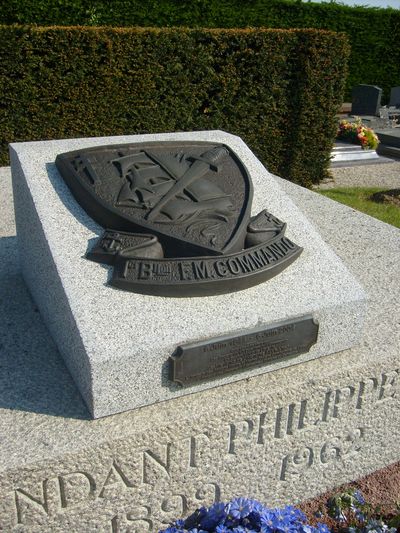Kieffer, Philippe
- Date of birth:
- October 24th, 1899 (Porte-au-Prince, Haiti)
- Date of death:
- November 20th, 1962 (Cormeilles-en-Parisis/Val-d'Oise, France)
- Buried on:
- Grave Philippe Kieffer
- Nationality:
- French
Biography
Philippe Kiefer was born October 24th, 1899 in Port au Prince, Haïti. He was een good student and went to the United States to study commercial economics from which he graduated.
During the 30’s he served as co-director of the National Bank of Haïti and Secretary of the Chamber of Commerce, later on he became director of a New York bank.
May 1939 he returned to France, was drafted on September 2nd, 1939 and accepted by the Navy a month later.
He served on the battleship Courbet and in Northern Fleet Headquarters during the battle for Dunkirk. June 18th, 1940 he was evacuated to Southampton by way of Cherbourg, subsequently he joined to the Free French Navy in London.
After having given English lessons to students at the Naval Academy, he got acquainted with the concept of commandos of the British, becomes enthousiastic and succeeded in persuading the British to establish a French commando unit.
After extremely tough and hazardous training in Scotland, 14 Commando’s and Kieffer take part in the raid on Dieppe.
October 8th, 1943, the 1 Batallion Fuseliers Navale was established and two of its French companies launch a series of night attacks by small groups on the coast of France in preparation of the invasion.
In 1944, 1 BFN was incorporated into the 4 British Commando Batallion, a part of the 1st SAS Brigade.
On June 6th, 1944, 177 French Green Berets, led by Kieffer go ashore on Sword and proceed on foot to Ouistreham. Kieffer is hit twice by shrapnel but refuses to be evacuated until two days later. After a fortnight, he rejoins his unit, prior to the break out to the Seine and Honfleur. Determined to be the first to reach Paris, although Normandy has hardly been cleared of German troops, he boards a jeep with two of his men and drives into Paris. In the same period, one of his three sons who had joined the Maquis, is killed by the Germans near Paris.
In October, Kieffer and three French companies of commandos take part in the attack on Vlissingen and Walcheren, the key to the port of Antwerp. Kieffer and his commandos undertake a few more actions in the Netherlands.
In 1948 his mémoires "Beret Vert" was published and in 1962 he was a consultant to the director of the movie The Longest Day.
Shortly afterwards, on November 20th, 1962, he passes away in Corneilles-en-Parisis.
Do you have more information about this person? Inform us!
- Period:
- Second World War (1939-1945)
- Rank:
- Capitaine (Flight Lieutenant)
- Unit:
- No. 1 Special Service Battalion, Special Air Service (SAS), Combined Operations Headquarters, War Office, British Government
- Awarded on:
- July 16th, 1944
"Commandant Kieffer was responsible for the mopping up of the town of Ouistreham in conjunction with 4 Commandos assault on the battery. His unit suffered severely, 9 out of his 11 officers becoming casualties, while Commander Kieffer was himself wounded. The dash and resolute action of this officer led to the final liquidation of a series of enemy strong points in the coastal built-up area, and of an enemy company in the town itself."
- Period:
- Second World War (1939-1945)
- Awarded on:
- May 29th, 1945
- Period:
- Second World War (1939-1945)
1 March 1945: "Magnifique unité détachée au 4eme Commando Britannique, sous les ordres du Capitaine de Corvette P. KIEFFER, a participé, 1e 1er Novembre 1944, après un débarquement par surprise, a l'assaut du port de FLESSINGUE (IIe de Walcheren) qui a été conquis de haute lutte en sept heures en dépit d'une résistance acharnée de 1'ennemi fortement retranché et trois fois supérieur en nombre.
A ensuite participé a l'attaque générale de 1'ile, mettant fin, le septieme jour, a toute résistance ennemie, et obtenant la reddition du Colonel allemand, des 35 Officiers et 1500 hommes qui la défendaient. Ce brillant fait d'armes a été relaté par le Commandement Suprême des Armée Alliées comme un des plus braves et des plus audacieux de la guerre."
23 June 1945: "Unité française incorporée une brigade de Commandos britanniques commandée par le Brigadier LEICESTER, a sous les ordres du Commandant KIEFFER, pris une part prépondérante aux opérations de débarquement de WALCHEREN.
Renommée par son courage, sa discipline, son allant parmi les troupes britanniques avec lesquelles elle combat, cette unité du 1er au 8 Novembre 1944, a joué un rôle capital dans les opérations qui aboutirent à la prise de l'Ille, en s'emparent du Port même de FLESSINGUE, success qui détermina la réussite de l'ensemble de l'opération."
10 September 1945: Sous 1e commandement du Capitaine de Corvette Philippe KIEFFER a fait preuve d'un magnifique esprit de sacrifice dans la conduite de raids secrets et de sondages des défenses ennemies sur les côtes de France, destinés à préparer 1er débarquement final.
Au prix de pertes sérieuses a participé et joué un rôle de premier plan dans l'exécution des raids glorioux de DIEPPE, INSIGNY, GRAVELINES, THE HOOK OF HOLLAND, BRAY-DUNES qui ont permis de recueillir des renseignements de la plus haute importance."
6 palmes de bronze et 1 étoile de bronze
- Period:
- Second World War (1939-1945)
- Period:
- Second World War (1939-1945)
- Period:
- Second World War (1939-1945)
- Period:
- Second World War (1939-1945)
- Period:
- Second World War (1939-1945)
- Period:
- Second World War (1939-1945)
- Period:
- Second World War (1939-1945)
- Period:
- Second World War (1939-1945)
- Period:
- Second World War (1939-1945)
Sources
- -Copy of the original recommendation byt the Lord Lovat Brigadier 1 Special Service Brigade - Stiwot archive
- Chemins de Mémoire
- Ordre de la Libération
- www.France-Libre.net
- www.commandos-fnfl.ifrance.com
- Quatre citations du 1er bataillon de fusiliers marins commando à l'ordre de l'armée de mer















